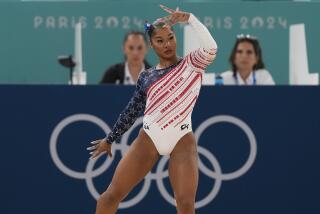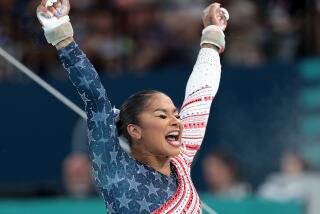Twists and Turns
- Share via
ATHENS — The U.S. gymnastics team won nine medals here, more than in the last two Olympics combined. They took both men’s and women’s individual all-around golds and both team silvers. Carly Patterson and Paul Hamm each won three medals.
But outside the arena ...
Russians whined, Canadians pouted, South Koreans threatened and judges hid.
Moscow media quoted Russian gymnastics officials as saying they had asked International Gymnastics Federation (FIG) and International Olympic Federation officials for a review of the scores of Alexei Nemov’s high bars routine Monday night and Svetlana Khorkina’s silver-medal all-around performance.
Nemov’s score prompted nearly 10 minutes’ worth of booing and might deserve the review. His high-flying routine included six release moves and was complimented by several gymnastics experts.
One of them, Kurt Thomas, a three-time world all-around champion, said, “I couldn’t see where the deductions came from, except maybe one-tenth [of a point] on the landing.”
He added, though, that Khorkina’s three-day whinefest about supposedly prejudicial scoring was “sour grapes, pure and simple.”
There also have been reports that the Canadians might protest the vault final and that the Bulgarians were unhappy about the still rings judging.
Meanwhile, the biggest mess, the Great Gymnastics Controversy of 2004, still festers. But maybe not for much longer.
The South Korean delegation had said it would petition the Court of Arbitration for Sport for a chance to plead the case of all-around bronze medalist Yang Tae Young. Yang’s parallel bar routine was scored too low and the Koreans have maintained that he, not Hamm, should have won the all-around gold medal.
Since Friday, the Koreans have protested to the FIG, the IOC and have threatened to go to CAS. By Tuesday night, however, they had not done so.
FIG officials said the discussion was over, that there would be no duplicate gold medal issued and that no one would take Hamm’s gold from him, suggesting, however, that it might be sporting of Hamm to give up the gold.
Hamm has said no -- he reportedly was on a plane back to the U.S. on Tuesday night, gold medal safely tucked away -- and CAS officials have said they probably would not take on a case involving an on-field discrepancy.
Judging debacles aside, though, it would appear that U.S. gymnastics is back.
Four years ago, the team left Sydney with no medals and in disarray. The women were squabbling, their coaches unhappy with coach Bela Karolyi and the way USA Gymnastics had allowed him to change the system.
And the men, who had been touted as contenders for a team medal, had flopped miserably too.
“We left Sydney with a plan to improve,” Bob Colarossi, USA Gymnastics president, said. “We were firm in our conviction to stick with it.”
On the women’s side, Karolyi’s wife, Martha, took over the team and tweaked his plan for mandatory training sessions at their Texas ranch.
Every month, about 20 girls and their coaches visited the ranch, where they were evaluated by Martha and sent home with suggestions, new skills to learn and a sense of teamwork. The men have prospered under a similar system. For example, the Hamm twins, Paul and Morgan, moved from Wisconsin and their lifelong coach to train in Columbus, Ohio, with three-time Olympian Blaine Wilson.
Then Paul Hamm’s historic triumph in the all-around and the subsequent controversy gave men’s gymnastics a much higher profile than previously. “They say any publicity is good publicity,” Thomas said from Texas, where he runs a gym. Added Bart Conner, a member of the 1984 men’s team: “The great thing about Paul’s win is that it gives boys a chance to see a future in the sport.”
The Hamms are only 21 and have every intention of sticking around for Beijing in 2008.
And, Bela Karolyi added: “The program is full of young girls, so many of them, sturdy, strong, fired up, more talent than anyone.... It’s only starting.”
More to Read
Go beyond the scoreboard
Get the latest on L.A.'s teams in the daily Sports Report newsletter.
You may occasionally receive promotional content from the Los Angeles Times.






